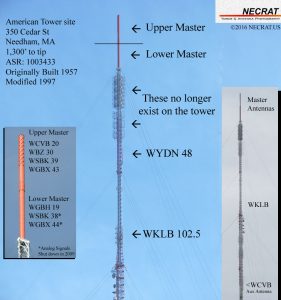NorthEast Radio Watch 3/31/2025: Jim Quinn Signs Off
In this week’s issue… Remembering Pittsburgh's Quinn - Seven Mountains enters Harrisburg - My launches new brands - Ryan out at B101 - More cuts at Radio Vermont - Another AM deleted
In this week’s issue… Second antenna failure at TV site – New format on Boston FM? – Galaxy buys in Berkshires – RIP, Ottawa’s Katfish
By SCOTT FYBUSH
*There’s not much bigger on New England TV than a Patriots game midway through a winning season. And so it was a heart-stopping moment, we’re sure, when an antenna failure knocked CBS’ WBZ-TV (Channel 4) and four other Boston TV signals off the air Saturday, less than 24 hours before Sunday’s 4 PM kickoff between the 6-1 Pats and the Steelers at Heinz Field in Pittsburgh.
 It’s still not clear exactly what went wrong 1400 feet above Needham, where this marked the second time in four years that the top master antenna at the 350 Cedar Street tower suffered a catastrophic failure. When the antenna went dark, it completely silenced WBZ, sister station WSBK (Channel 38) and public TV station WGBX (Channel 44) everywhere except Comcast cable, which gets direct fiber feeds of the stations. Hearst’s ABC affiliate WCVB (Channel 5) also uses the antenna, but it alone has a lower-power standby antenna mounted partway down the Cedar Street tower, allowing its signal to stay on the air for over-the-air viewers in the core of the market as well as for DirecTV and Dish Network viewers.
It’s still not clear exactly what went wrong 1400 feet above Needham, where this marked the second time in four years that the top master antenna at the 350 Cedar Street tower suffered a catastrophic failure. When the antenna went dark, it completely silenced WBZ, sister station WSBK (Channel 38) and public TV station WGBX (Channel 44) everywhere except Comcast cable, which gets direct fiber feeds of the stations. Hearst’s ABC affiliate WCVB (Channel 5) also uses the antenna, but it alone has a lower-power standby antenna mounted partway down the Cedar Street tower, allowing its signal to stay on the air for over-the-air viewers in the core of the market as well as for DirecTV and Dish Network viewers.
As with the 2012 failure, the broadcasters found a temporary solution over the weekend: the signals of WBZ (RF 30), WCVB (RF 20), WGBX (RF 43) and WSBK (RF 39) will be re-routed to the lower half of the master antenna, which normally transmits only WGBH (Channel 2/RF 19), while the WGBH signal is sent to WCVB’s lower standby antenna.
The temporary fix (plus a quicker fix on Dish Network, which routed Pittsburgh CBS station KDKA-TV to Boston-market viewers) got the Pats game back on most of the market’s TV sets in time for viewers all over greater Boston to see the team beat the Steelers. But it continues to expose one of the ongoing problems since the DTV transition: few broadcasters, even in big markets, have been willing to spend the dollars needed to build out redundant transmitter facilities. There’s a certain amount of logic to that; with the DTV repack and ATSC 3.0 conversion coming in the next few years, a facility that could cost into the millions to build will likely need expensive conversions and reconstruction very quickly. There’s risk, too, though – while an October Pats game isn’t exactly the Super Bowl, it would have meant a big loss of revenue to CBS and WBZ if the game hadn’t made it to air.
Back in 2012, when it took most of the summer to get things back to normal at the Needham site, we wrote, “it’s a good bet that larger TV broadcasters will be thinking a little harder about the need for better backup facilities for their DTV transmissions.”
Will a second outage finally be the prod that’s needed to get a better plan in place to keep signals flowing to DirecTV, Dish, Charter and direct OTA viewers in Boston? And will other broadcasters look to this outage and make plans in case their antenna fails, too?
(Thanks to Mike Fitzpatrick at NECRAT.us for the handy infographic…)

And if you don’t have your Tower Site Calendar, now’s the time!
If you’ve been waiting for the price to come down, it’s now 30 percent off!
This year’s cover is a beauty — the 100,000-watt transmitter of the Voice Of America in Marathon, right in the heart of the Florida Keys. Both the towers and the landscape are gorgeous.
And did you see? Tower Site of the Week is back, featuring this VOA site as it faces an uncertain future.
Other months feature some of our favorite images from years past, including some Canadian stations and several stations celebrating their centennials (buy the calendar to find out which ones!).
We still have a few of our own calendars left – as well as a handful of Radio Historian Calendars – and we are still shipping regularly.
The proceeds from the calendar help sustain the reporting that we do on the broadcast industry here at Fybush Media, so your purchases matter a lot to us here – and if that matters to you, now’s the time to show that support with an order of the Tower Site Calendar. (And we have the Broadcast Historian’s Calendar for 2025, too. Why not order both?)
Visit the Fybush Media Store and place your order now for the new calendar, get a great discount on previous calendars, and check out our selection of books and videos, too!
[private]
*The biggest group of radio stations in Berkshire County, MASSACHUSETTS is changing hands, bringing a new owner to the Bay State. Galaxy Communications exited nearby Albany a few years back, but now it’s paying just over $3 million to take over the Berkshire Broadcasting stations in Pittsfield, North Adams and Great Barrington from Gamma Broadcasting.
The transactions with Gamma come in two parts: a $1.68 million deal for Berkshire Broadcasting Co. that will bring in classic hits WUPE-FM (100.1 North Adams), AC WNAW (1230 North Adams), full-service WSBS (860 Great Barrington) and WUPE translator W277CJ (103.3 Pittsfield), plus a $1.47 million sale of classic hits WUPE (1110 Pittsfield), talk WBEC (1420 Pittsfield) and hot AC WBEC-FM (95.9 Pittsfield) directly from Gamma to Galaxy II Media LLC.
Also changing hands is WSBS translator W231AK (94.1 Great Barrington), which Gamma will buy from Rick Kelly’s Northeast Airchecks LLC for $20,000 and then sell to Galaxy II as part of the WBEC deal.
And there’s one more shuffle that Galaxy appears to have had in the works for a while: W221CZ (92.1 South Burlington, VERMONT), the translator Galaxy bought from Dennis Jackson to move to its WTLB (1310 Utica NY), will instead be moved to 93.9 in Pittsfield to become a translator of WBEC(AM).
 *Is Boston about to get a new FM format? All signs point to a sixth FM at what’s now the Greater Media cluster once Beasley completes its takeover there. How do you put a sixth FM in a market that’s capped at five? Translators, of course – and in this case, W231BI, the translator Beasley is buying from Radio One to relay its WRCA (1330 Watertown).
*Is Boston about to get a new FM format? All signs point to a sixth FM at what’s now the Greater Media cluster once Beasley completes its takeover there. How do you put a sixth FM in a market that’s capped at five? Translators, of course – and in this case, W231BI, the translator Beasley is buying from Radio One to relay its WRCA (1330 Watertown).
Did Beasley pay $400,000 just to have a translator for WRCA’s leased-time ethnic programming? That seemed unlikely when the deal was filed in August, and it all came together last week when we began hearing that Beasley was giving WRCA’s programmers a 30-day notice that their leases wouldn’t be renewed in November.
While the programmers scrambled to find space on Boston’s other leased-time AMs such as WUNR (1600), WLYN (1360) and WAZN (1470), the rumor mill began churning about what will come next on 1330 and its new FM partner, which will be a 99-watt signal from the Prudential Center on 106.1. The existing Greater Media cluster will bring Beasley modern rock (WBOS 92.9), rhythmic hits (WBQT 96.9), country (WKLB 102.5), classic rock (WROR 105.7) and AC (WMJX 106.7); will Beasley use its new 1330/106.1 combo to add something like an urban AC to the mix? We’ll be keeping a close ear to the ground on this one as it edges toward a presumed November launch…
*In Lowell, there’s quite the spat brewing at WCAP (980), where two leased-time program hosts have quit, citing interference from station owner Sam Poulten. John MacDonald and George Zaharoolis walked off their “JMac and the Bear” show Wednesday, saying Poulten had walked in during their broadcast and objected to the tone of their conversation with political activist Mary Burns. Poulten says the hosts violated station policy, which prohibits candidates from appearing on the station within 30 days of the election; the hosts say their freedom of speech was violated, though NERW observes that the First Amendment does not guarantee (and never has guaranteed) that sort of “free speech” on someone else’s radio station. (NERW further notes that things have come a long way since our own days at WCAP more than 25 years ago…)
*There’s a change of leadership at the Empire Broadcasting cluster around Albany, NEW YORK. Neerav Patel, who’s spent four years as chief operating officer of the cluster, has moved on to a new job in predictive analytics at IBM. (In addition to radio experience that stretched back to his student days at Siena College’s WVCR, Patel has extensive experience in the computing world.)
At Empire, Jim Millis will now serve as GM and newcomer Lou Roberts as operations manager for the cluster that includes WJKE (101.3 the Jockey), WAIX (1160/Mix 106.1) and WABY (900).
*Up north, WIRY-FM (100.7 Plattsburgh West) wants to move a little closer to town; it’s applied to trade its present 2.3 kW DA/725′ C3 signal from the hills near Dannemora for a new 6 kW/177′ class A signal from a site just north of Plattsburgh between Moffitt Road and the Northway. Why downgrade? Because the new location will put a much higher signal strength over the center of Plattsburgh, better overcoming the incoming co-channel interference from CBFX in Montreal.
 *In Binghamton, top-rated CBS affiliate WBNG (Channel 12) has unveiled a new set and a new logo. The new “12 News” identity puts WBNG in close company with other stations owned by Quincy Newspapers.
*In Binghamton, top-rated CBS affiliate WBNG (Channel 12) has unveiled a new set and a new logo. The new “12 News” identity puts WBNG in close company with other stations owned by Quincy Newspapers.
*And in New York City, WQHT (97.1) morning hosts Ebro Darden and Laura Stylez have added a new gig. What are they doing hosting the 1-4 PM (PT) shift on Alpha Media’s KWEE (96.3) in Portland, Oregon? Speculation points to a new syndicated offering…
*In CONNECTICUT, “Jagger” (Mike Thomas) is the new PD at iHeart’s WKSS (95.7 Hartford) and WKCI (101.3 Hamden/New Haven), giving up his current roles at iHeart New York as WKTU (103.5) night jock and WHTZ (Z100) music director. Jagger replaces Zac Davis, who’s now at iHeart in Richmond.
*In PENNSYLVANIA, Ted Schober is buying WKGE (850 Johnstown), paying Birach Broadcasting just $25,000 for the station, which has been either off the air or on extremely reduced power since the failure of its old nine-tower transmitter site. Schober is also the applicant for an 850 signal in Enola, serving Harrisburg – which helps explain why WKGE immediately filed an application to move the Johnstown signal to 870, where it would become a daytimer with 7 kW using three of the former nine 850 towers. (In the meantime, WKGE has applied for 1 kW day non-directional under STA using just the center 850 tower.)
EMF Broadcasting is buying two northern Pennsylvania FMs it was leasing from Joseph Iorio’s Radio Partners, LLC. WLKE (93.5 Gallitzin) and WLSF (105.1 Sheffield) will change hands for $400,000.
And while it’s across the line in West Virginia, we note that the sale of a Morgantown cluster has a big Keystone State connection: buyer LHTC Media is a subsidiary of Laurel Highlands Total Communications, which is adding substantially to its radio holdings with the $700,000 purchase of AM stations WTCS and WMMN and FM stations WZST and WRLF from Spectrum Radio Fairmont LLC. Will LHTC look to expand its Pennsylvania presence, which consists for now of WCNS (1480 Latrobe) and WAVL (910 Apollo)?
*On the other side of the state, WIP (94.1 Philadelphia) is assembling a new lineup after firing afternoon co-host Josh Innes a few weeks back: current 10 AM-2 PM co-host Ike Reese will be moving to the afternoon slot when a new show is announced there soon; the 10-2 slot, meanwhile, is going to former WPEN (97.5) night host Joe DeCamara and former Eagles star Jon Ritchie.
And we send our congratulations to IndyCAM, Philadelphia’s public access media center, which launched live programming Thursday on WPPM-LP, its portion of a share-time on the 106.5 frequency.
*In CANADA, it’s looking like TTP Media may actually have a signal on the air in Montreal sometime soon. Early last week, several keen local observers (including the estimable Steve Faguy) picked up on two YouTube videos posted by Nicolas Tétreault, apparently the remaining active partner in the group. The videos showed the Kahnawahke transmitter site that TTP plans to use for its English-language talk station on 600 and its French-language talk station on 940, and noted that TTP had just completed a purchase of the site from former owner Cogeco.
 Faguy confirmed that Cogeco has indeed sold the site to TTP for an undisclosed amount, a key development as the TTP group approaches the CRTC’s drop-dead “final” deadlines to get the stations on the air, Nov. 9 for 600 and Nov. 21 for 940. And while the videos have disappeared from YouTube, several listeners in the Montreal area reported hearing test signals on 940 on Thursday.
Faguy confirmed that Cogeco has indeed sold the site to TTP for an undisclosed amount, a key development as the TTP group approaches the CRTC’s drop-dead “final” deadlines to get the stations on the air, Nov. 9 for 600 and Nov. 21 for 940. And while the videos have disappeared from YouTube, several listeners in the Montreal area reported hearing test signals on 940 on Thursday.
If anything does make it to air by next month, it looks like it will be fairly bare-bones: there’s no studio for the stations, nor any announcements of staff being hired. And if TTP does get the stations on the air, it will face brutal competition from the existing talk behemoths in the market, Bell’s CJAD (800) in English and Corus’ CHMP (98.5) in French.
*In La Tuque, Quebec, CFLM (97.1) is changing hands from Radio Haute-Mauricie to Attraction Media. The C$766,725 deal gives Attraction its twelfth signal in Quebec.
*In Ottawa, listeners and co-workers are mourning Katfish Morgan, an original member of the CILV (Live 88.5) staff who died Friday. “Morgan,” whose real name was Andre Maisonneuve, had worked all over Canada before joining CILV as morning co-host for its launch in 2005. He left the “Live” airwaves in May after being diagnosed with the cancer that claimed his life.
 In Hamilton, CHCH-TV (Channel 11) has sold the building it’s called home since its debut in 1954. The station won’t actually move from the historic mansion (and 1983 addition) on West Jackson Street until sometime in 2018, and it’s still looking for its next studio location. The buyer of the building and the sale price haven’t yet been announced. (You can see a tour of the building on this Site of the Week page from 2015.)
In Hamilton, CHCH-TV (Channel 11) has sold the building it’s called home since its debut in 1954. The station won’t actually move from the historic mansion (and 1983 addition) on West Jackson Street until sometime in 2018, and it’s still looking for its next studio location. The buyer of the building and the sale price haven’t yet been announced. (You can see a tour of the building on this Site of the Week page from 2015.)
Toronto’s CFMJ (640) is shuffling its lineup next month: Matt Gurney of the National Post and Supriya Dwivedi of the Toronto Sun and the CBC will take over morning drive, sending John Oakley to afternoons. Mike Stafford’s show shifts an hour earlier to 9 AM-noon, Tasha Kheiriddin gets that extra noon hour to add to her 1-2 PM slot, and Kelly Cutrara replaces Jeff McArthur in the 2-4 PM slot. (McArthur, who also hosts Corus’ “Global Morning News,” will contribute to the new Gurney/Dwivedi morning show when it launches Nov. 7.)
*And on TV, Corus is about to make a big rebranding at CHEX-TV-2 (Channel 22) in Oshawa, the small local station that’s been branded as “Channel 12 Durham” since splitting away from former parent CHEX-TV (Channel 12) in Peterborough more than a decade ago.
 Starting next Monday, the station will join CHEX-TV and Kingston’s CKWS-TV (Channel 11) in picking up the national newscasts from Corus-owned Global, including “Global Morning News” and the early-evening “Global National.” (And like CHEX-TV and CKWS-TV, CHEX-TV-2 will continue to carry the CTV prime-time programming that replaced CBC there last year.)
Starting next Monday, the station will join CHEX-TV and Kingston’s CKWS-TV (Channel 11) in picking up the national newscasts from Corus-owned Global, including “Global Morning News” and the early-evening “Global National.” (And like CHEX-TV and CKWS-TV, CHEX-TV-2 will continue to carry the CTV prime-time programming that replaced CBC there last year.)
The big change will be in the local newscast, which will be rebranded from “Studio 12 News” to “Global Durham” with enhanced graphics. “Global Durham News” will air at 5 PM with repeats at 7 and 11. The Durham-region station will also simulcast Global’s Toronto newscast from 5:30-6:30 PM.
[/private]
From the NERW ArchivesYup, we’ve been doing this a long time now, and so we’re digging back into the vaults for a look at what NERW was covering one, five, ten, fifteen and – where available – twenty years ago this week, or thereabouts. Note that the column appeared on an erratic schedule in its earliest years as “New England Radio Watch,” and didn’t go to a regular weekly schedule until 1997. One Year Ago: October 26, 2015 *They kept us all on the hook for three years, but the commissioners at the FCC finally dropped more than 70 pages of First Report & Order, Notice of Proposed Rule Making and Further Inquiry on Friday afternoon, closing the first chapter in the long process of AM radio revitalization. Leaving aside for the moment the question of whether the marketplace has already decided AM’s fate and whether “revitalization” would have been more relevant several decades earlier, Friday’s lengthy document opens some interesting new doors for the broadcasters who are still trying to succeed on AM.
Here’s how it will work: initially – and soon – the FCC will open a six-month window in which class C and D stations (the old “graveyard” class IV channels and former daytimers) can move one commercial-band FM translator from as far as 250 miles away, and to any open commercial-band FM channel in the new market. That will be followed by three more windows: a three-month window for any AM station to do a 250-mile transmitter move, then windows in 2017 for C and D stations, then any station, to apply for a brand-new translator. *An AM sale in northeast PENNSYLVANIA: GEOS Communications is selling WAZL (1490 Hazleton) to JMJ Radio for just $30,000. JMJ owns Catholic WQOR (750 Olyphant) at the north end of the Wilkes-Barre/Scranton market and will likely simulcast WQOR on WAZL. In Albany, Empire Broadcasting has segued WABY (900 Watervliet) from standards toward oldies. In addition to adding more 60s and 70s tunes to a lineup that already included music from as far back as the 1930s, WABY is also now carrying the Don Imus morning show, which hadn’t been heard locally in the Capital District for a decade or so. *Sad news from the Southern Tier: Kevin Doran, longtime owner of WLEA (1480) and WCKR (92.1) in Hornell, has died after a long illness. Doran had started in radio at WLEA in high school in the 1950s and later worked at competitor WWHG (later WHHO, now silent). He helped put several stations on the air in Mississippi and Alabama, worked briefly at WPGC in Washington, spent some time in Dubuque, Iowa at competitors KDTH (1370) and WDBQ (1490), then returned to Hornell to work as a high school teacher and newspaper reporter in the late 1960s. He bought WLEA from Charles Henderson in 1972, added WCKR a decade later, and also owned WBTA (1490 Batavia) in the 1980s and 1990s. Doran was 77 when he died on Wednesday. (You should read a nice recollection of Doran’s influence on another local radio voice over at Bob Lonsberry’s blog.) Five Years Ago: October 24, 2011 *The first signs of Cumulus Media’s takeover of the Citadel radio group emerged late last week in NEW YORK, and they’re not pretty: at least a dozen people are out of work at the Two Penn Plaza headquarters of what are now Cumulus’ largest stations, WABC (770) and WPLJ (95.5).
On WABC, Mancow Muller’s local weekend show got the ax, though he’ll continue with his national syndicated show over at Talk Radio Network. Most of the other cuts at WPLJ and WABC happened off the air: WPLJ general sales manager Helen Hammel is gone, as is WABC producer Jill Vitale (known as “Flirty Flipper” during her days producing Sean Hannity). So far, the latest round of Cumulus cuts seem to be limited to the former ABC Radio stations that passed through Citadel on the way to Cumulus; the stations that had been with Citadel longer, in smaller markets such as Syracuse and Portland and Erie, were already pretty lean when Cumulus took over and have thus far been spared much of the pain.
What you see at left is a collection of some of the most important innovators in FM stereo’s history, including (second from left, seated) Dick Burden, the last surviving member of the 1961 committee charged with selecting a standard for FM stereo. The panel also included processing gurus Bob Orban, Frank Foti, Eric Small and Bill Sacks, as well as Belar founder Arno Meyer, engineers Richard Mertz and Herb Squire and the NAB’s Skip Pizzi. (It was webcast, and we’re hoping to be able to offer a link to archived audio and video in an upcoming edition of NERW.) As Pizzi noted in his closing remarks, FM stereo has outlived a whole host of more highly-touted broadcast technologies – and as Sacks pointed out, it’s one of the few technologies that became a world standard, with the only competition, now defunct, coming from the Soviet polar-modulation scheme. *New Jersey’s WSNR (620 Jersey City) and MASSACHUSETTS‘ WWZN (1510 Boston) are getting new owners – sort of. Peter Davidson’s Blackstrap Broadcasting is being transferred to Media Americas Corporation in a deal valued at $23.5 million plus assumption of debts. The transfer will reduce Davidson’s interest in the stations from 99% to just 45%; the remainder of the new Media Americas group will be held by the Rapoza Family Trust (Rhode Island’s Craig Rapoza, who owns WALE 990 in Greenville, R.I.) and Trilight Enterprises, controlled by Russell Jones, who’s been a board member at Blackstrap. No changes are expected to either station’s operation; WWZN is largely leased out to progressive talk programmer Jeff Santos, while WSNR programs mainly to New York’s Russian community. *Norman Corwin’s name is no longer well known in the contemporary radio community, but there was a time when Corwin was a giant on the radio landscape. A native of Boston, Corwin began his broadcast career in Springfield in the early 1930s as a newsman at WBZA, sister station to Boston’s WBZ. By 1936, he’d moved to New York City to work at the new WQXR, and two years later he was working for CBS as the creator of “Norman Corwin’s Words Without Music.” World War II brought Corwin his biggest successes, including the valedictory show “On a Note of Triumph,” which aired to an audience of 60 million listeners on VE Day in 1945. Corwin went on to travel the world, producing the documentary series “One World Flight” before turning to screenwriting in the 1950s. As he aged, Corwin remained remarkably active, creating a series of radio dramas for NPR in 1979 and then repeating the feat in 2001 (“More by Corwin”). Up until his 100th birthday last year, Corwin was still teaching at the University of Southern California – and answering e-mails from admirers, your editor included. Corwin died last Tuesday (October 18) at age 101, perhaps the last great living link to the Golden Age of Radio. Ten Years Ago: October 23, 2006 The AM dial in CANADA just keeps getting emptier – at least everywhere outside its biggest cities. Last week, three more AM signals in eastern Canada applied to move to FM, even as three other applicants filed for new AM signals in Toronto and Montreal. The AM-to-FM moves first: CHUM Ltd. wants to get off the AM dial in Peterborough and Kingston, Ontario. In Peterborough, it’s hoping to move CKPT (1420) to 99.3, with 17 kW DA (5.7 kW average ERP)/91.5 meters, while in Kingston it wants to move CKLC (1380) to 98.9, with 15 kW DA (8.7 kW average ERP)/132.3 meters. If approved by the CRTC after a hearing December 18, the moves would leave each city with one AM (Corus’ CKRU 980 and CFFX 960, respectively), and would give CHUM three FM signals in Peterborough (counting CKLY in Lindsay) and two in Kingston. (It also raises the potential for still more interference across Lake Ontario, this time with WLLW 99.3 in Seneca Falls and WBZA 98.9 in Rochester.) The exodus from the AM dial in Nova Scotia continues, too: Newcap is applying to relocate CFDR (780 Dartmouth/Halifax) to 88.9, with 50 kW DA (21 kW average ERP)/188.8 meters. If the move is granted, Newcap says it would divest its half-interest in CKUL (96.5 Halifax), since it also owns CFRQ (104.3 Halifax). The December 18 hearing will also include three applications for new AM signals: Radio Humsafar wants 1400 in Montreal, with 1 kW; S.S. TV Inc. wants 1650 in Brampton, Ontario, with 1 kW day/680 watts night; and Neeti P. Ray wants 1650 in Mississauga, Ontario, with 1 kW. All three of these stations would be multi-ethnic. In western MASSACHUSETTS, they’ve been wondering for a while about the status of WVEI-FM (105.5 Easthampton), the Springfield move-in that will become the newest relay of Boston’s all-sports WEEI whenever it finally gets on the air from Mount Tom. Now there’s a date – WEEI has been promoting October 26 as sign-on day for 105.5. There’s a new station on the air in NEW YORK’s Southern Tier – Equinox Broadcasting’s WRRQ (106.7 Windsor) began broadcasting last week, doing AC as “Q107.” It’ll take over the 104.5 Ingraham Hill translator (W283AC Johnson City) that was being used by sister station WCDW (100.5 Susquehanna PA), and it’ll also be heard in downtown Binghamton on new translator W236AP (95.1). It’s been a rough week for the folks at CBS Radio in New York. At the network level, they said goodbye to Christopher Glenn, the veteran anchor who retired in February. He died Tuesday (Oct. 17) of liver cancer, at 68. Upstairs at WCBS (880), they’re mourning Mary Gay Taylor, the station’s veteran City Hall reporter, who died Friday (Oct. 20) of breast cancer, at 71. Two more from the obituary page: Mike Phillips, who made a name for himself at the old WXLO (98.7, now WRKS) and WWDJ (970 Hackensack) in the early seventies, died last Monday (Oct. 16) near Seattle, at 64. Phillips worked in Portland, Seattle and San Francisco, in addition to a long run as PD of oldies KRTH (101.1) in Los Angeles. And while Bob Lassiter made his name in Florida and Chicago talk radio, he also worked at WOUR (96.9 Utica) and WJOI (93.7 Pittsburgh, now WRKZ) in the early seventies. Lassiter died Oct. 13, at 61. Fifteen Years Ago: October 22, 2001 Radio People on the Move: Kevin Baker returns to Albany after his stint in Rutland, Vermont launching Vox classic rocker WEXP (101.5 Brandon) as “the Fox.” Baker will join Ed Levine’s Galaxy Broadcasting as it takes over WKLI (94.5 Ravena) and WABY (1400 Albany) and moves WHTR down to 93.7 in Scotia to serve the Albany market. Meanwhile, no replacement has been named at WEXP, where Baker was the founding PD and afternoon drive jock. Ted Edwards is leaving his PD job at WBAB (102.3 Babylon) on Long Island to become VP of operations and development at Jesscom, as well as PD of its new KFME (105.1 Garden City MO) in the Kansas City market. And Steve Andolino moves up from PD to OM at AAA’s WBEA (101.7 Southold) and WEHM (96.7 East Hampton) way out on Long Island’s East End; Brian Cosgrove takes his PD stripes. We’ll hop across Long Island sound to CONNECTICUT next, just the same way WMOS (104.7 Montauk NY) is doing with its studios. The station’s call change (it used to be WBEA and was briefly WCSO) turns out to be no coincidence: owner AAA Entertainment has worked out a deal with the Mohegan Sun casino in Uncasville to base WMOS in a studio near the casino’s entrance, promoting it as “Mohegan Sun Radio.” Very clever! (And we can attest from personal experience that the WMOS signal blasts across Long Island Sound to that part of southeastern Connecticut…) Look for C|Net Radio to land on WBPS (890 Dedham) beginning November 5; the tech-talk network (currently heard only on KNEW 910 in the San Francisco market) will take over programming 24/7 on the Mega Broadcasting station, putting an end to the “romantica” music now running there as “Amor 890.” Twenty Years Ago: October 23, 1996 WBOQ (104.9), the classical outlet licensed to Gloucester MA, is now in very good new hands. Southfield Broadcasting LP transferred the license to Marlin Broadcasting on October 1st, in a deal that was all in the family (Southfield was owned by Douglas Tanger, and Marlin belongs to his brother Woody). Marlin owns classical WTMI (93.1) Miami, and recently sold classical stations in Detroit (WQRS 105.1) and Philadelphia (WFLN 95.7). Across the state line in Ballston Spa NY, WZRQ (102.3) has dropped its Z-Rock format in favor of classic rock, as WXCR. Z-Rock was being discontinued at the end of the year anyway, and the modern-rock bent to Z-Rock’s programming was conflicting with WZRQ’s new duopoly partner, “The Edge” (WQBK-FM 103.9 Rensselaer/WQBJ 103.5 Cobleskill). The 1150 spot on Boston’s radio dial is now home to yet another set of call letters, its third this fall. Sometime late Sunday night or Monday morning, Kidstar’s Boston affiliate quietly changed its call from WROR(AM) to WNFT(AM), which, according to the folks at station owner Greater Media, stands for “Nifty 1150.” The WNFT calls were last used in Jacksonville, Florida, on TV channel 47. (That station in turn picked up an old New England callsign — the WTEV(TV) calls that were used on Channel 6 in New Bedford MA from 1963 until the late seventies. From the “What the….?!?!?!?” File: M Street this week reports that 1370 in Wickford RI has added Westwood One’s adult standards service to its local programming. So far so good; but M Street then goes on to identify the station as “WKFD,” and says it “uses the calls WEGM as a slogan.” That prompted a lot of head-scratching here at NERW headquarters, since when we visited the station in July (see the July 23 NERW for all the details), they were using WEGM as their sole ID. But sure enough, a check of the FCC database finds that the folks down at 1919 M Street still think 1370 is WKFD! So…either “WEGM” never actually applied for its new calls…or the FCC database is way off on this one. Go figure. Just over the state line, there’s still more call-change action going on. Cobleskill NY’s WDCS 1190 has changed calls to WLAL. The daytimer was recently sold to a listener who was able to afford to keep it running, something the previous owners were apparently unable to do. And M Street says Poughkeepsie NY’s WNSX 96.1 is now on the air, running ABC’s satellite modern AC format. A visit to that part of the Hudson Valley is long overdue for the NERW traveling radio caravan… A bit further afield in upstate NY, Remsen NY’s WUUU (serving the U-U-Utica market, of course) has applied for the WRFM calls on 93.5. Those calls were, of course, long resident on 105.1 in New York City. Syracuse newcomer WXCD (105.9) has changed calls to WLTI, formerly found in Detroit. WGLI (1290) in Babylon, Long Island — a station that’s been dark for years — has applied for WZZU. And NERW has applied for a grant for aspirin from the headache we get keeping track of all this movement! A brief NERW this time around…as the region continues to recover from one of the heaviest rainstorms in recent memory. Some parts of Maine received over 19 inches of rain in just over a day, and many roads remain closed. One effect was clearly audible on the Boston dial: the absence of WNRB (1510) from the airwaves. WNRB’s transmitter is in a very low-lying area of Waltham, along a stream called Beaver Brook. When the waters began rising Sunday night, they flooded the parking lot in which the station’s four towers sit, then entered the concrete transmitter house, eventually rising more than a foot above the floor. Both the main 50kw Nautel transmitter and the backup suffered damage, and when NERW stopped by last night, an engineer was still removing water from the Nautel’s cabinet. It’s a credit both to WNRB’s engineers and to Nautel that the station is back up and running this morning. NERW wishes them good luck…and the good long rest they’ll undoubtedly need after all that bailing out. It will take a lot longer for Portland, Maine’s WLOB (1310) and WLOB-LP (Channel 45) to make it back on the air. The station’s building on Warren Avenue in Portland was flooded to the roof, and word has it that damage inside was extremely severe. WGAN (560) has its transmitter just across the highway from WLOB, but remained on the air throughout the storm. |
In this week’s issue… Remembering Pittsburgh's Quinn - Seven Mountains enters Harrisburg - My launches new brands - Ryan out at B101 - More cuts at Radio Vermont - Another AM deleted
Tower Site goes Jeeping (and fixing a flat tire!) up in the mountains of northwest New Jersey
In this week’s issue… New signal for Boston's WJIB - "New Standards" changes stations - New home for Maine FM - Remembering NYC's Diaz, Maine's "Mr. Mike," Albany's McGrath, Rochester's Petschke
A look at two of the Voice of America facilities that were abruptly shuttered this month